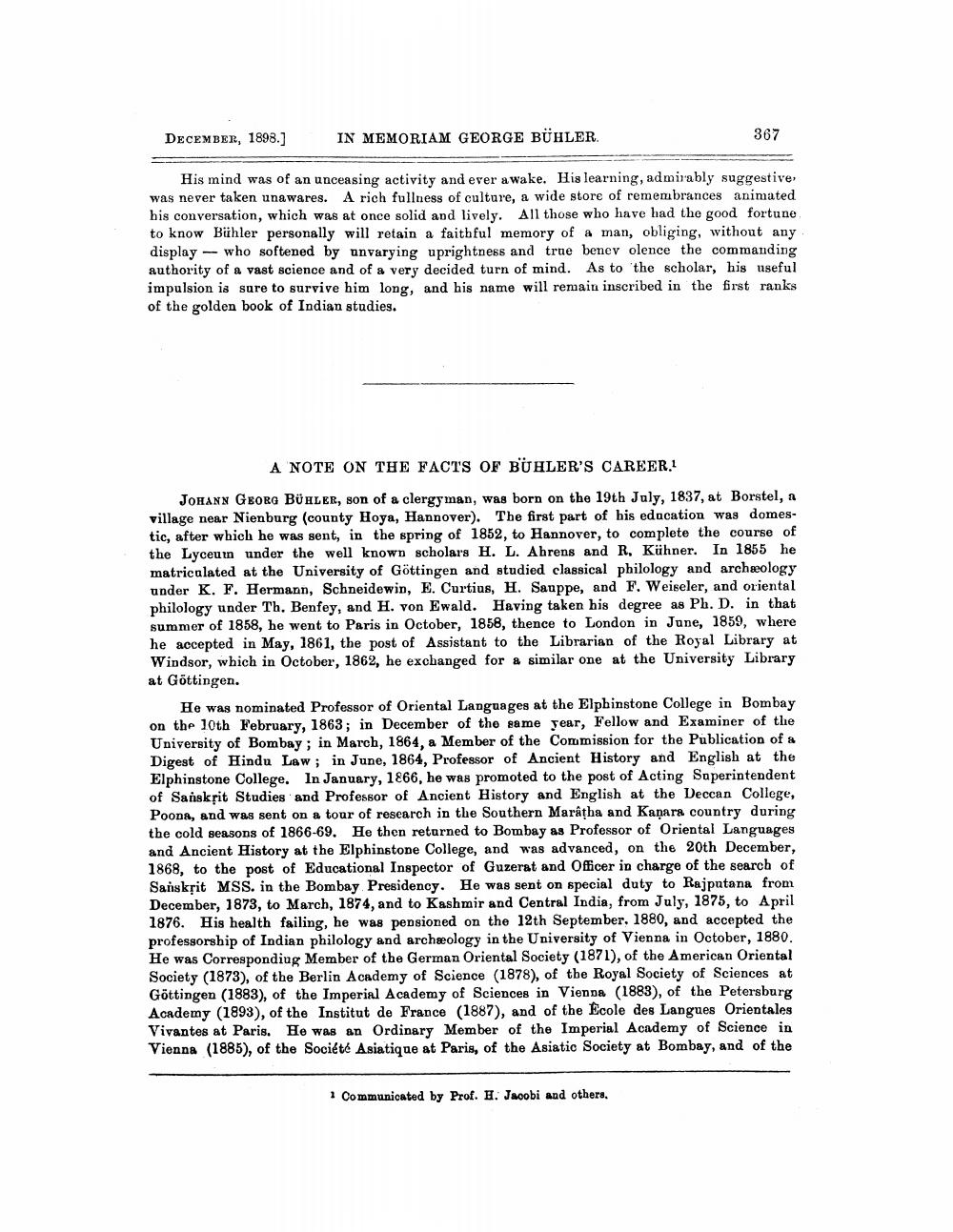________________
DECEMBER, 1898.]
IN MEMORIAM GEORGE BÜHLER
367
His mind was of an unceasing activity and ever awake. His learning, admirably suggestive was never taken unawares. A rich fullness of culture, a wide store of remembrances animated his conversation, which was at once solid and lively. All those who have had the good fortune to know Bühler personally will retain a faithful memory of a man, obliging, without any display -- who softened by unvarying uprightness and true benev olence the commanding authority of a vast science and of a very decided turn of mind. As to the scholar, his useful impulsion is sure to survive him long, and his name will remain inscribed in the first ranks of the golden book of Indian studies.
A NOTE ON THE FACTS OF BÜHLER'S CAREER.
JOHANN GEORG BÜHLER, son of a clergy man, was born on the 19th July, 1837, at Borstel, a village near Nienburg (county Hoya, Hannover). The first part of his education was domestic, after which he was sent, in the spring of 1852, to Hannover, to complete the course of the Lyceun under the well known scholars H. L. Ahrens and R. Kühner. In 1855 he matriculated at the University of Göttingen and studied classical philology and archeology under K. F. Hermann, Schneidewin, E. Curtius, H. Sauppe, and F. Weiseler, and oriental philology under Th. Benfey, and H. von Ewald. Having taken his degree as Ph. D. in that summer of 1858, he went to Paris in October, 1858, thence to London in June, 1859, where he accepted in May, 1861, the post of Assistant to the Librarian of the Royal Library at Windsor, which in October, 1862, he exchanged for a similar one at the University Library at Göttingen.
He was nominated Professor of Oriental Languages at the Elphinstone College in Bombay on the 10th February, 1863; in December of the same year, Fellow and Examiner of the University of Bombay; in March, 1864, a Member of the Commission for the Publication of a Digest of Hindu Law; in June, 1864, Professor of Ancient History and English at the Elphinstone College. In January, 1866, he was promoted to the post of Acting Superintendent of Sanskrit Studies and Professor of Ancient History and English at the Deccan College, Poona, and was sent on a tour of research in the Southern Maratha and Kaņara country during the cold seasons of 1866-69. He then returned to Bombay as Professor of Oriental Languages and Ancient History at the Elphinstone College, and was advanced, on the 20th December, 1868, to the post of Educational Inspector of Guzerat and Officer in charge of the search of Sanskřit MSS. in the Bombay Presidency. He was sent on special duty to Rajputana from December, 1873, to March, 1874, and to Kashmir and Central India, from July, 1875, to April 1876. His health failing, he was pensioned on the 12th September, 1880, and accepted the professorship of Indian philology and archaeology in the University of Vienna in October, 1880. He was Corresponding Member of the German Oriental Society (1871), of the American Oriental Society (1873), of the Berlin Academy of Science (1878), of the Royal Society of Sciences at Göttingen (1883), of the Imperial Academy of Sciences in Vienna (1883), of the Petersburg Academy (1893), of the Institut de France (1887), and of the Ecole des Langues Orientales Vivantes at Paris. He was an Ordinary Member of the Imperial Academy of Science in Vienna (1885), of the Société Asiatique at Paris, of the Asiatic Society at Bombay, and of the
1 Communicated by Prof. H. Jacobi and others,




